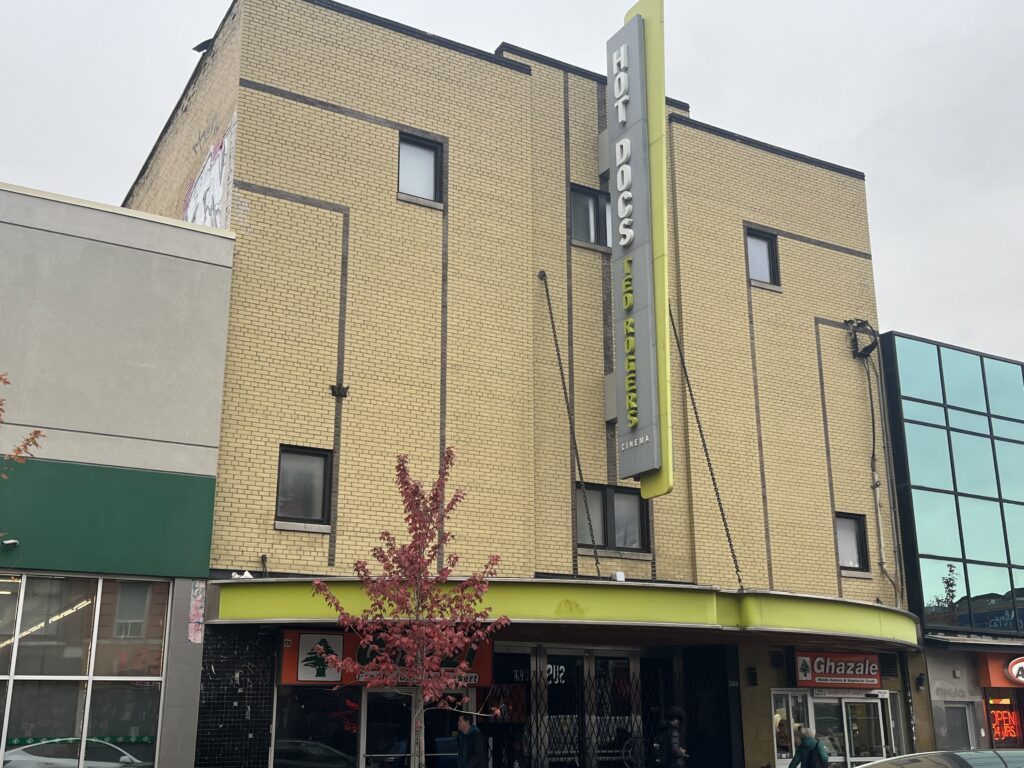
Listen to the full story here:
The Hot Docs Theatre is up for sale and many are anxious about what could happen to the century year old building on Bloor Street West. The sale is further evidence of the financial troubles Hot Docs has endured over the past year.
The property popped up on multiple real estate websites, including the CRBE following an announcement made by the theatre in a press release last month,
The commercial real estate company’s executive vice president posted a flyer on his LinkedIn last week that was shared on Reddit, leaving many Hot Docs and neighbourhood film lovers upset about the possible outcomes concerning the building’s legacy.
In a comment section predicting various aftermaths and worries, user @Illogicat5764 wrote, “That’s a pretty gross way to advertise the sale of one of the few remaining cultural institutions we have left. Using cinema style branding to persuade someone to demolish the cinema doesn’t sit well with me.”
Brianna Russell, a fourth-year film student at Toronto Metropolitan University (TMU), says throughout her education she has learned about what the theatre and company has done for the city’s documentary film community.
“A lot of people who don’t love film don’t specifically seek out documentaries unless there’s a reason to go see them. And that’s why a space like Hot Docs is so important. [It] was even just to have that singular space show that work and to really experience that together,” said Russell.
The Hot Docs Theatre at 504-508 Bloor Street West, originally called the Madison Theatre, was built in 1913. It was designed by architect John Alexander Mackenzie, and was one of the first film houses in the city. Throughout the years, it has undergone numerous name changes and two renovations.
Though it has been a staple in Toronto’s film culture for over a century, plans for the theatre’s future lie in the hands of its unknown potential buyer.
For community members looking to protect the beloved structure, the City of Toronto offers resources that can streamline the process.
“The main thing with heritage is not to put a bell jar on it. It’s not like you’re casting it as it cannot change. It’s rather about managing the change so that it complements or is respectful of the historic features of the building,” said Tamara Anson-Cartwright, program manager at the city’s Heritage Preservation Services. She said that historical change is inevitable yet salvageable concerning the constantly changing infrastructure people are seeing across the city.
With the renovations in 1940 and 2011, the theatre itself has undergone interior changes that have kept it up to date in certain areas. Because of these redesigns, the historical significance of the theatre could be up for debate according to Paul Moore.
“I think one of the problems, specifically for Hot Docs, is that it’s been modernised and renovated so many times… [They] removed a whole series of historic features. So it isn’t historically significant. It’s culturally significant,” said Moore, a TMU sociology professor and Canadian movie theatre historian. He points out that there is a big difference between the categorization of historical and cultural importance regarding theatres in the city.
Moore says theatres like the Royal Alexandra, or even small ones like the Fox or the Revue, are historically significant due to their conserved architecture and interior design. When comparing those to Hot Docs, it’s not the same.
The cultural significance of the theatre has much to do with its dedication to broadcasting documentary films from all over the world. With many of the city’s theatres not solely focusing on this genre, its preservation of the craft is one that many film lovers will miss according to both Moore and Russell.
“It’s a place where people are able to connect. Where underrepresented voices are able to be heard,” said Russell.
“We’re not dealing with big Cineplex movies at these kind of spaces. It’s for indie filmmakers, and it’s for people who are making different kind of work that kind of disrupts the mainstream. Without these spaces, where does that work play?” she said.
The city urges anyone who wants to protect the theatre to visit its website and learn about how to register it as a heritage site or contact the area’s local Coun. Dianne Saxe, for more information.
Olivia is a Toronto and GTA based reporter for On The Record.
This article may have been created with the use of AI tools such as Google Docs, Grammarly, and/or Otter.ai for transcription.

